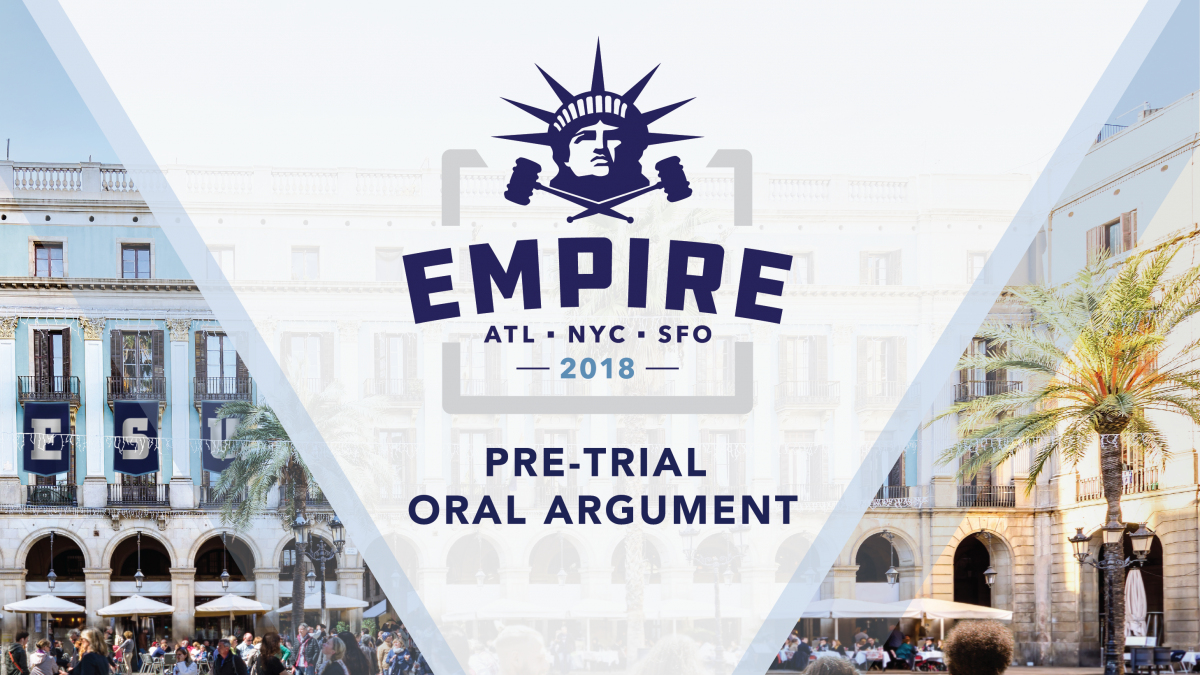2018 Pre-Trial Oral Argument
An Introduction
What does the First Amendment say about hate speech? How does a public university balance the free exchange of ideas with campus safety? Who should bear the costs of security when controversial speakers want to express their unpopular views? And how far can free speech protections stretch before they snap? These are the questions at the core of this year’s Empire Pre-Trial Oral Argument (POA).
The controversial speaker in this year’s case is Harry McCarson. He’s a well-known white nationalist who has a history of using hateful language at rallies and on social media, directed at the Empirials: the indigenous people of Empirion. McCarson is charged with a crime that occurred on February 20, 2018 (we’re not telling you what that crime is yet!) He faces trial in the fall of 2018. As we’re about to explain, this year’s POA involves a separate legal matter.
Fact Summary
In late 2017, Empirion State University’s (ESU) First Amendment Club invited McCarson to speak on campus. The speech was scheduled for February 19, 2018. In the weeks leading up to the event, ESU and the First Amendment Club discussed the security challenges that McCarson’s appearance would pose. Both sides recognized that McCarson’s past history of divisive and hateful language would likely lead to protests and counter-protests, which could cause violence on campus. The University and Club sought to reach a compromise in which they shared the security costs. Negotiations broke down, and the Club sued the University in federal court.
Legal Posture
The First Amendment Club has filed suit against the university, and they’re seeking a “temporary restraining order” (TRO). A TRO is a short-term civil order, issued by a judge or magistrate, that forbids a person or entity from engaging in some threatened action against someone else. So in this case, the Club is saying that it needs the Court to rule in its favor immediately so that it can have McCarson speak on campus.
Naturally, McCarson’s position is that the university is discriminating against him because they don’t agree with his views. Is he right? Maybe. But ESU will never admit to that. Their defense is that security costs are substantial.
POA Timing is Mock
Like our beloved activity, the timing of the POA and trial are mock. In real life, the POA would take place on February 12. Remember, the Club’s goal is to ensure that McCarson can speak on February 19. The TRO is also a separate civil action, so it would never take place on the same date, and in the same courtroom, as McCarson’s criminal trial.
But this is mock trial. So we can suspend reality for a bit 🙂
When your round starts, you’ll begin with the “February 12th” oral argument. Each team will give a 10 minute oral argument, like in prior years. Then we’ll take a break. When we restart, we’re now in the present day, arguing a separate criminal trial involving McCarson (again, we’re not telling you what that is yet… it’s a surprise)! The lawyers who represent McCarson will do so in both the pre-trial AND the trial; the lawyers who represent ESU in the TRO will represent the Government in the trial.
Is this an unconventional setup? Perhaps. But we felt that the importance of the First Amendment issue made a little time travel worth it!
Impact on the Trial?
The outcome of the POA will change the facts of the trial slightly, but the basic timeline remains:
- February 12 – Oral Argument
- February 19 – Speech at ESU
- February 20 – Alleged Crime
If McCarson loses the TRO, he finds a wealthy benefactor to pay for his security. If he wins, the university pays. Either way, he will speak on campus. The only question is whether having to pay out-of-pocket for the speech could provide McCarson with further motivation to commit whatever crime he may have committed on February 20th!
Conclusion
This year, we are excited to share the POA materials 10 days before we publish the full case. That’s because we want you to spend some time reviewing the materials as a team–with a clear head and blank slate–before the entire case file is released.
We are also excited to make the POA materials publicly available for all schools to enjoy! We’re only issuing one caveat: schools must contact Empire about licensing the POA materials if they: (i) are not registered for a 2018 Empire competition; (ii) plan to participate in a meeting or competition (‘event’) using the 2018 POA materials; and if (iii) that event involves three or more mock trial teams from a different school. We can be reached at admin@empiremocktrial.org.
We hope that you enjoy the POA. We think that it will provide you with a unique opportunity to learn about the intersection of the First Amendment and hate speech, as well as the unique challenges that public universities face when controversial speakers come to campus. Additionally, we’ll take a look over the upcoming months at how the U.S. laws governing hate speech differ from many of their Western counterparts.
You can access the 2018 Pre-Trial Oral Argument Materials below:
2018 POA: McCarson v. ESU

